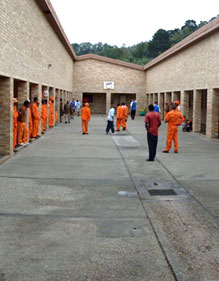
Last week it marked its 100 days in office and the developments mentioned above are among those that have been announced in that time by ministers.
It’s the top executive’s task to strategise and encourage policymaking to ensure the success of the departments they lead, with the provision of service at the centre of their plans. They are accountable to Parliament, which oversees their work and asks who spends how much of the taxpayers’ money, and on what.
The first 100 days in office are a good indicator of whether or not the top executive will have good strategies for the departments they lead. It is not enough time to gauge the merits of these policies, but the three months of settling in to their positions gives them the opportunity to set goals.
Education department dropping the ball
In his State of the Nation address in June, Zuma alluded to the plans by government to roll out a major project of providing furniture to all schools in the Eastern Cape schools by mid-August. The province’s schools system and environment has been under the spotlight for a while, with organisations like Equal Education actively fighting to get government committed to respond to infrastructure needs. The procurement processes for the project, Zuma had said, would be overseen by the office of the chief procurement officer, Kenneth Brown.
Shortly after the mid-August deadline, Angie Motshekga’s basic education department announced that it had begun with the rollout of its school furniture programme in the province. The project had, however, not gone without hiccups. The provincial head of the education department, Mthunywa Ngonzo, was suspended pending an investigation of alleged mismanagement into the tender. The investigation continues and the national treasury told Corruption Watch in July that it was confident that the furniture project would be a success.
Improvement in the prison system
On the other hand, the Department of Correctional Services announced its plans to establish a professional council for corrections. The council will be set up over the next three years and will be responsible for:
- competent correctional officials through effective registration, and continuous professional development;
- appropriate development of correctional practitioners through accreditation of educational institutions and education programmes;
- regulation of practice by investigating complaints and disciplinary processes;
- South African registered corrections practitioners are recognised when measured against international standards; and
- the development of relevant standards for identification of correctional work, and regulation thereof.
Chief deputy commissioner of incarceration and corrections James Smalberger said the establishment of the council would ensure competence amongst correctional services employees.
Last month Corruption Watch reported on corruption in prisons and how prison officials tend to abuse their power, often with the cultivation of a culture of corruption. The Wits Justice Project’s Nooshin Erfani-Ghadimi contextualised corruption in prisons by saying it is a co-dependent relationship, where "everyone needs everyone else to be corrupt”.
Better management of government property
In an effort to organise government’s property portfolio for better management, public works minister Thulas Nxesi announced the Property Management Trading Entity (PMTE), which will be set up under his department. The purpose of the PMTE, said Nxesi, is to professionalise the work of managing property and save costs in the process. It would also help improve government services to the public by bettering the quality of public buildings.
The state’s portfolio is worth over R300-billion and includes such assets as buildings and pieces of land that have been earmarked for investment or development. The business plan for the entity got the nod from Cabinet last week.
Streamlining the housing allocation process
Human Settlements minister Lindiwe Sisulu has also been working to fix the problem areas of her portfolio. Allocation is the particular element of the government’s RDP housing project that is most prone to corruption and abuse, and in an effort to rectify its inefficiencies, Sisulu recently told Parliament, a national database of beneficiaries of the housing project will be set up using the technology provided by Sita.
“We will sign a service level agreement with Sita and the housing database will be up and running within this period of 100 days,” Sisulu told Parliament in August. Corruption Watch has followed the issue of housing allocation closely in the past, noting the challenges that come with it.
Xolani Xundu, the department’s spokesperson last year, told Corruption Watch that the process of allocating houses falls outside the national department’s mandate, which largely involves the funding of the provincial housing projects and policy support.
A national list doesn’t exist, he said, and provinces are left to manage their own databases. Sisulu’s move will hopefully alleviate problems associated with allocation in the future.
Tighter immigration laws
One minister who hit the ground running with the process of implementing policy was Malusi Gigaba of Home Affairs. Soon after his appointment he announced his department’s plan to tighten immigration laws with the object of, among others, fighting abuse of the system by applicants with dubious intentions.
Parliament welcomed the briefing in which the department explained the reasoning behind the proposed amendments to the current laws. In a statement, home affairs portfolio committee chairperson Lemias Mashile said he welcomes the assurance by the department that it is working towards uprooting any form of corruption that might impede the implementation of the regulations.

